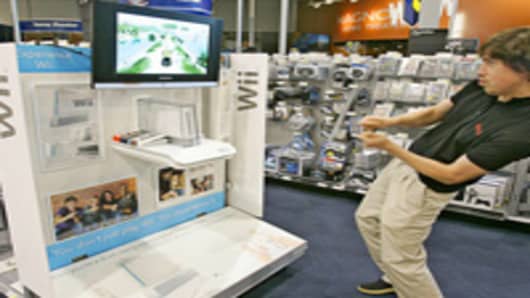Following price cuts by its two rivals, Nintendo reduced the price of its Wii video game system by $50. The widely expected move could help the company reverse slowing momentum as it heads into the holiday sales period.
The Wii’s price will fall to $199 this Sunday. This is the system’s first price change since it was introduced in 2006.
Three years is an extraordinary stretch for a gaming system to go without a price cut — but the Wii is far from a typical system. Nintendo chose to focus on lapsed- and non-gamers this generation, altering the way games are played rather than markedly improving the graphics and features of the previous cycle of video game machines. As a result, the Wii has dramatically outsold the Xbox 360 and PlayStation 3.
Both Sony and Microsoft have cut the retail price of their systems in the past month. Sony introduced a redesigned, slimmer PS3 for $299—condensing their available systems to a single device. The move resulted in a 72 percent month-over-month increase in hardware sales.
Microsoft still offers two models of the Xbox 360—a $199 entry-level system and a system for core gamers, which recently reduced its retail price by $100 to $299.
While Nintendo is far and away the hardware sales leader in the gaming industry, Wii sales are nearly 10 percent off last year’s pace. And, given Sony’s momentum since its price cut, the company’s hands have been tied.
Software sales for the Wii—and the industry in general—have stagnated this year, due to a lack of blockbuster games and the ongoing economic crisis. Even “Wii Sports Resort,” expected to be one of Nintendo’s best selling games this year, got off to a slower start than the company had hoped.
Like the moves by Sony and Microsoft, Nintendo’s announcement was a poorly kept secret. Retail circulars from Wal-Mart and Toys R Us that heralded the new price leaked online more than a week ago.
The company had hoped to avoid this action for as long as possible—even going out of its way to squelch industry speculation that it would cut prices.
In June, company president Satoru Iwata noted that while analysts and publishing partners are always pushing for price reductions, the move is not the cure-all many believe it to be.
“People often talk about the price cut as if it’s an almighty weapon,” he said. “The fact of the matter is what a price cut can do is rather limited … At the time of the price cut, we see a momentary spike in sales, but usually that cannot sustain its momentum and [sales] come down to below the price cut level.”
Those momentary spikes can be significant, though. The NPD Group, which tracks game and gaming hardware sales, says that historically, price cuts result in a month-over-month sales increase of anywhere from 40-60 percent.
Even if the Wii price cuts result in a sales surge, it may not be enough to turn the year around for the gaming industry. Barring a 14 percent increase in sales every month for the rest of the year, 2009 will be the first year since 2004 to fail to post a year-over-year sales increase.


